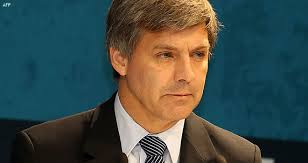By Andrew Warshaw, chief correspondent
November 5 – The man who led the official FIFA inspection team that evaluated the credentials of 2022 World Cup hosts Qatar says November-December must be ditched as a possible date for a winter tournament, warning it would cause untold chaos for the international calendar.
Last week, almost four years after awarding Qatar hosting rights in the double ballot that sent the 2018 World Cup to Russia, FIFA appeared to edge ever-closer to an unprecedented decision to break with tradition and stage the 2022 tournament in winter because of the fearsome Gulf mid-summer heat.
Following negotiations with football’s various stakeholders amid constant media interest, two options emerged as most likely period for the tournament, November/December and January/February, the former the personal preference of FIFA president Sepp Blatter.
Another meeting of the FIFA Task Force set up a year ago to try and agree on the most suitable compromise will take place in the New Year, with a final decision on a firm date for 2022 expected in March.
Harold Mayne-Nicholls, who led the team that visited all nine candidates for 2018 and 2022 in the period leading up to the December 2010, vote, says only two viable alternatives should be seriously considered for Qatar – January-February or May with evening kickoffs.
“November-December will create a complete mess for almost all the leagues in the world, not just for Europe,” Mayne-Nicholls said in an interview with Insideworldfootball.
“I have not been able to come up with a single way to avoid the trouble that November-December would bring. How are you going to have two weeks to prepare, and then play the tournament before Christmas. You’d have to stop everything by the 22nd at the absolute latest, and probably earlier. There would simply not be time.”
European clubs and leagues have long campaigned against disrupting their season and Mayne-Nicholls, a Chilean who used to run his country’s federation, says playing the World Cup in the first of the two possible winter slots would be just as bad for the rest of the world.
“In the southern hemisphere, we finish in November/December. I have not seen a single proposal that can work around this. The leagues would have to finish by October.”
Mayne-Nicholls has long been against a traditional summer World Cup in Qatar because of potential health risks and made that clear in his original report to FIFA when he flagged up several caveats about the wisdom of hosting the tournament in the Gulf state.
But hosting the tournament one month earlier than usual, he says, with kickoffs after the sun goes down, could work even though FIFA appear to have pushed the May option down the list of priorities.
“It’s clear that June and July is not possible, I agree 100 percent with that, so it’s commonsense to do it in the evening in May if not in January-February. You’d have to stretch the calendar but not by much.”
Mayne-Nicholls, who recently announced he was considering standing for the FIFA presidency next year, has already suggested kickoff times of 7pm, 10pm and 1am for Qatar. “You would only need to play at the later time in the early stages,” he said. “After the first round you could play everything before midnight.”
Whilst he prefers January-February to November-December, he says neither would be ideal. Much has been made of the dangers of a January switch possibly clashing with the winter Olympics but Mayne-Nicholls believes broadcasters in the United States would be just as unhappy with staging the World Cup anywhere near the time of the Super Bowl.
“The US market is not a small market. The Super Bowl is a big party for America and they pay huge money for it. Maybe you could finish the World Cup on a Saturday for the first time and that way protect the Super Bowl which takes place on a Sunday. What we cannot do is put two such big events together.”
Contact the writer of this story at moc.l1734851407labto1734851407ofdlr1734851407owedi1734851407sni@w1734851407ahsra1734851407w.wer1734851407dna1734851407

